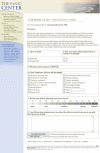Usage and longitudinal effectiveness of a Web-based self-help cognitive behavioral therapy program for panic disorder
- PMID: 15829479
- PMCID: PMC1550639
- DOI: 10.2196/jmir.7.1.e7
Usage and longitudinal effectiveness of a Web-based self-help cognitive behavioral therapy program for panic disorder
Abstract
Background: Anxiety disorders are common problems that result in enormous suffering and economic costs. The efficacy of Web-based self-help approaches for anxiety disorders has been demonstrated in a number of controlled trials. However, there is little data regarding the patterns of use and effectiveness of freely available Web-based interventions outside the context of controlled trials.
Objective: To examine the use and longitudinal effectiveness of a freely available, 12-session, Web-based, cognitive behavioral therapy (CBT) program for panic disorder and agoraphobia.
Methods: Cumulative anonymous data were analyzed from 99695 users of the Panic Center. Usage statistics for the website were examined and a longitudinal survey of self-reported symptoms for people who registered for the CBT program was conducted. The primary outcome measures were self-reported panic-attack frequency and severity at the beginning of each session (sessions 2-12).
Results: Between September 1, 2002 and February 1, 2004, there were 484695 visits and 1148097 page views from 99695 users to the Panic Center. In that same time period, 1161 users registered for the CBT program. There was an extremely high attrition rate with only 12 (1.03%) out of 1161 of registered users completing the 12-week program. However, even for those who remained in the program less than 12 weeks we found statistically significant reductions (P<.002) in self-reported panic attack frequency and severity, comparing 2 weeks of data against data after 3, 6, or 8 weeks. For example, the 152 users completing only 3 sessions of the program reduced their average number of attacks per day from 1.03 (week 2) to 0.63 (week 3) (P<.001).
Conclusions: Freely available Web-based self-help will likely be associated with high attrition. However, for the highly self-selected group who stayed in the program, significant improvements were observed.
Conflict of interest statement
Dr. Farvolden has acted as a paid consultant to Van Mierlo Communications Consulting Inc., Toronto, ON, Canada, the owner of the Panic Center content and software.
Figures
References
-
- Dinos Sokratis, Stevens Scott, Serfaty Marc, Weich Scott, King Michael. Stigma: the feelings and experiences of 46 people with mental illness. Qualitative study. Br J Psychiatry. 2004 Feb;184(2):176–81. doi: 10.1192/bjp.184.2.176. http://bjp.rcpsych.org/cgi/pmidlookup?view=long&pmid=14754832. - DOI - PubMed
MeSH terms
LinkOut - more resources
Full Text Sources
Medical





